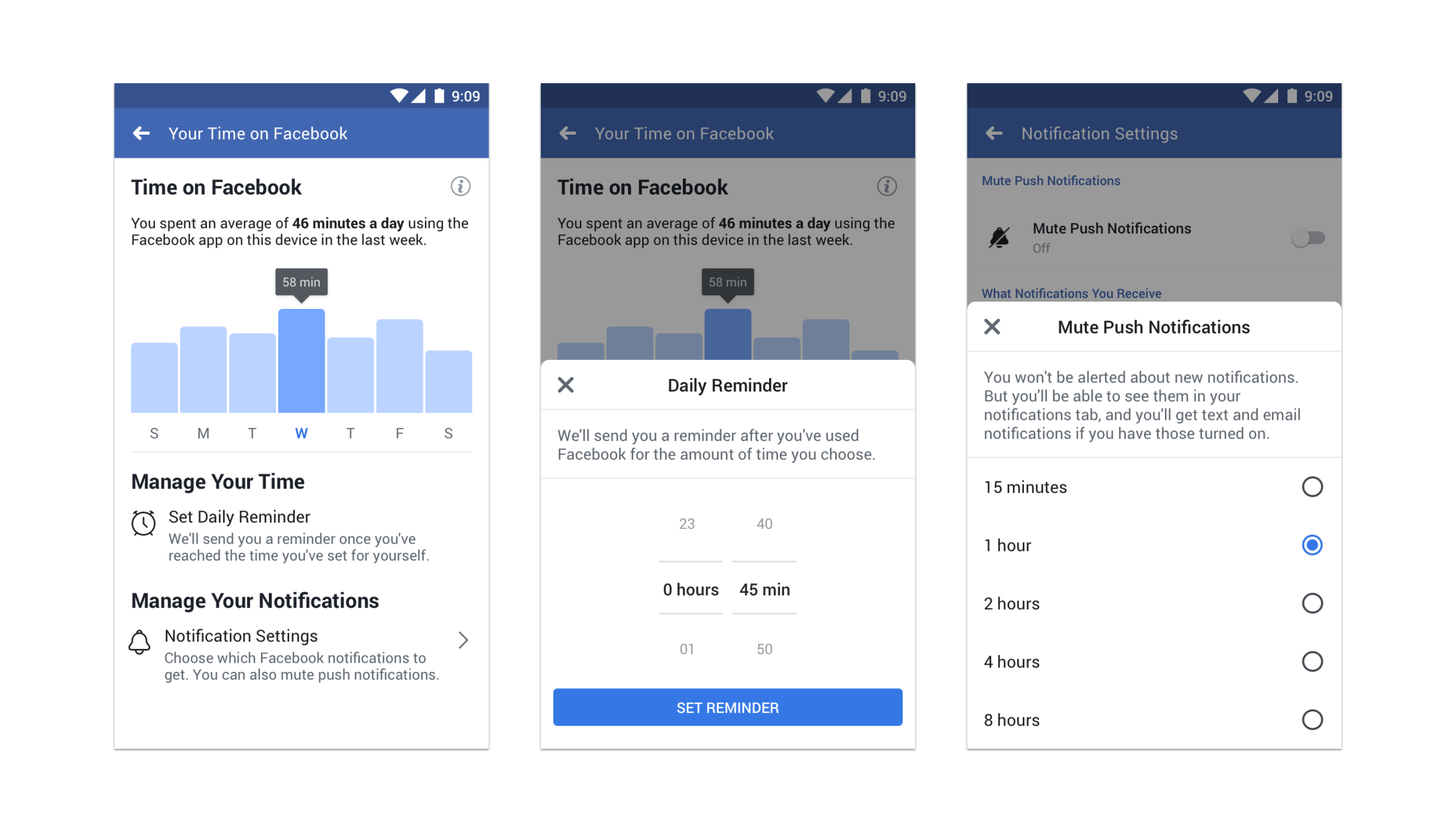Tech critics have sounded alarms about the vast amount of time Americans now spend glued to their screens and accused big companies of pushing products that are designed to be addictive. Earlier this year, Facebook CEO Mark Zuckerberg acknowledged that passively scrolling through endless social media feeds isn’t necessarily optimal for people’s well-being and announced that one of the company’s “big focus areas” for 2018 would be making sure that users’ time on the platform is “well spent.”
On Wednesday, the company rolled out tools aimed not just at optimizing users’ time, but limiting it. Similar tools are also being added to Instagram.
“Our hope is that these tools give people more control over the time they spend on our platforms,” Facebook’s David Ginsberg and Instagram’s Ameet Ranadive said in a joint blog post, noting that the features were developed in consultation with mental health experts.
News that time-management tools were in development broke earlier this summer but it was not clear at the time when they would be available to users. As of Wednesday, users can now go to their settings and consult trackers showing the average amount of time they spend on Instagram or Facebook on that device. They can also view daily tallies and choose to get alerts when they’ve spent a specified amount of time using a given app in a single day. Both platforms will also have a new option to “Mute Push Notifications,” so that FOMO-inducing alerts will be suspended for a matter of minutes or hours. “This will limit your Facebook or Instagram notifications for a period of time when you need to focus,” as the blog post put it.

The rollout comes a day after Facebook revealed new evidence of dangers lurking on the social media platform. In advance of the U.S. midterm elections, the company found evidence of a political influence campaign and removed 32 accounts and pages from Facebook and Instagram. Though company officials said it was unclear who might be behind the effort, an analysis from the Atlantic Council’s Digital Forensic Research Lab said that “an initial scan shows behavioral patterns and use of language reminiscent of the troll operations run from Russia in 2014 through 2017.”
Facebook makes money from selling advertisements that users view while they’re on the platform. That means that encouraging users to limit their usage runs counter to the company’s business model. But as Facebook has weathered scandals and endured criticism in areas ranging from privacy to hate speech to election security, Zuckerberg has emphasized that the well-being of users is Facebook’s top priority. In January, the CEO announced that the platform would change the mix of content appearing in users’ feeds so that they saw more from friends and family and less from brands and publishers. Though Zuckerberg acknowledged that this would likely lead people to spend less time on Facebook, he said that it would make the time they did spend on the platform “more valuable.”
In the long term, such changes might help the platform retain users. In late July, the company reported lower-than-expected sales and user growth numbers, leading Facebook stock to take a historic plunge. The company lost about $120 billion in market value following the news.
The blog post announcing the new tools touted the company’s sundry efforts to be clear-eyed about the effects the platform is having and to improve the experience of users. The company has leveraged algorithms to identify and “demote” clickbait and posts that contain claims fact checkers have rated as false. Facebook added a “Snooze” feature so that people could choose not to see posts from a certain person for 30 days without unfriending them altogether. On Instagram, users now see a message saying “You’re All Caught Up” when they’ve scrolled through all the posts that have been added by the people they follow in the last 48 hours.
“It’s our responsibility to talk openly about how time online impacts people,” Ginsberg and Ranadive said in the post, “and we take that responsibility seriously.”
More Must-Reads From TIME
- The 100 Most Influential People of 2024
- The Revolution of Yulia Navalnaya
- 6 Compliments That Land Every Time
- What's the Deal With the Bitcoin Halving?
- If You're Dating Right Now , You're Brave: Column
- The AI That Could Heal a Divided Internet
- Fallout Is a Brilliant Model for the Future of Video Game Adaptations
- Want Weekly Recs on What to Watch, Read, and More? Sign Up for Worth Your Time
Contact us at letters@time.com